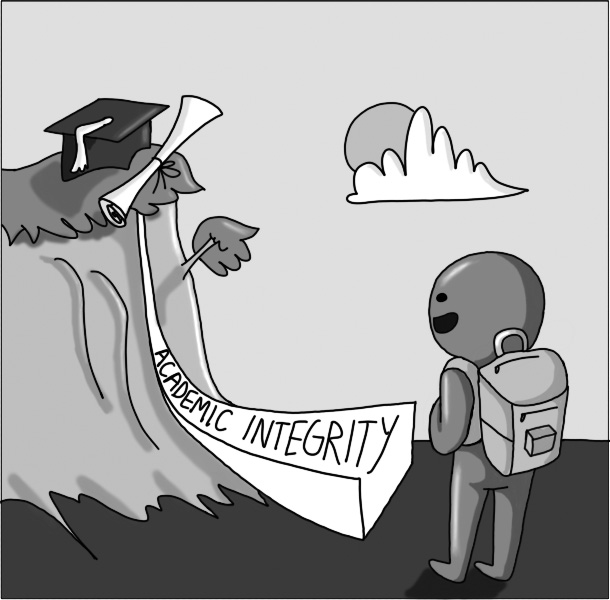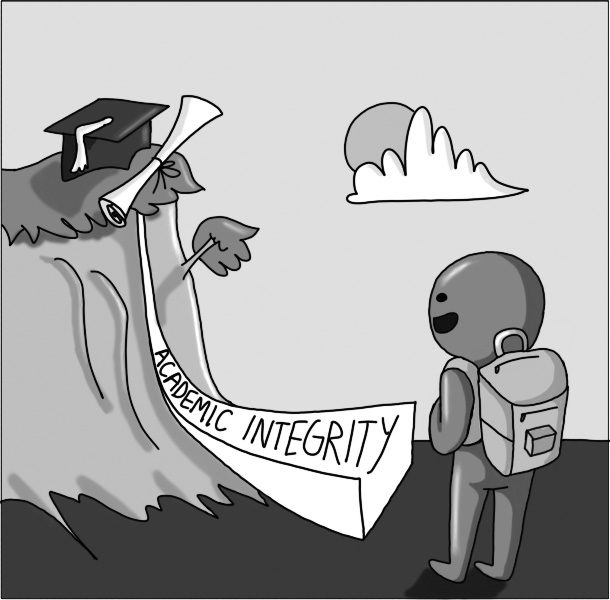

Aragon introduced an updated academic integrity policy. The policy, developed by the Aragon staff, establishes a clear set of rules for academic dishonesty.
“Three years ago, it came to my attention that every classroom had different academic integrity policies,” said Assistant Principal Lisa Nagendran. “I noticed … that [the policy] didn’t seem super equitable and fair … some of it depended on which teacher you had or which class you were taking.”
Nagendran assembled a small task force of teachers to create a draft of the policy, which was later reviewed by the entire staff.
“The reason it came to the forefront wasn’t so much because of a sense of pervasive cheating, but it was more about some of the egregious incidents that have happened,” said English teacher Holly Estrada.
English teacher Victoria Daniel explains some of the incidents that prompted the Aragon staff to update the policy.
“There was one that I knew about where a student had found an exam, got exam answers and texted them out to a whole bunch of people,” Daniel said. “Another [incident] was where an earlier period told a later period about something that was on a test, and then students went and researched answers in preparation for that test.”
Estrada thinks a clear policy will ensure that students will fully understand how to maintain academic integrity.
“We wanted to give the students support [by] saying, ‘let’s make sure you’re 100 percent clear on what we mean,’” Estrada said. “Some of those instances can result in students not getting letters of recommendation [or] having something put in their file that will be shown to a college about breaking academic integrity.”
Senior Victor Qiu believes that updating the policy won’t prevent cheating.
“Cheating isn’t a thing you can fix instantly,” Qiu said. “I would assume that everyone who cheats knows the repercussions of cheating, [and] giving more punishments and being more explicit about [them] is not going to dissuade anyone.”
Estrada implements the new policy in her classes by discussing how students can be proactive to prevent academic dishonesty.
“I find that it’s best to talk about situations that have actually come up in the context of my class, and then try to provide actions that students can take ahead of time to avoid falling into that pit,” Estrada said. “Most of us presume that the students don’t compromise their integrity because they’re bad people, but because they … get themselves into a sticky situation where they don’t feel like they have the time or ability to succeed.”
Qiu thinks that cheating stems from pressure to perform well academically.
“Cheating is a rampant problem that comes from our school mindset,” Qiu said. “Aragon is known for being very academically good. When you put such an emphasis on academics in our school, it just creates this environment [where] if you don’t perform well, then you just feel really pressured … to the point that you feel like you’re falling behind everyone. You just don’t want to be seen as the person who’s failing.”
Daniel believes the updated policy is promising, but is hesitant.
“I would say I am cautiously optimistic,” Daniel said. “I’m hopeful that it will make anyone who is prone or tempted to cheat think twice.
“I think it’s a shame that we have to have this [policy], but it’s a reality. Our digital world makes it so much easier [to cheat],” said Daniel.
Qiu thinks the updated policy shouldn’t be the only solution to cheating.
“What we need to do is establish an environment that is okay with not doing amazing,” Qiu said. “Any kind of improvement or even just doing well, in general, should be treated the same. Basically a growth mindset, not success or failure.”



